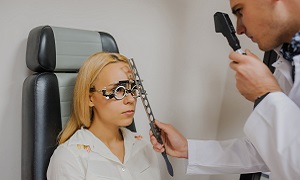Keratoplasty
Cornea transplant also termed as keratoplasty, is a surgical procedure for replacing a part of your cornea with corneal tissue from a donor. This procedure is meant to restore vision, reduce your pain as well as improve the appearance of your cornea if it has been diseased or damaged.
The majority of cornea transplants are generally successful. But every cornea transplant carries with it a small risk of complications, such as rejection of the donor cornea.
The cornea is a vital organ, as it helps protects your eyes from germs, dust as well as other foreign particles. The cornea also permits light to enter your eyes.
Purpose
The purpose of keratoplasty or corneal transplant is to restore vision to people who suffer from a damaged cornea. The transplant may relieve pain or other signs and symptoms which are associated with diseases of the cornea.
This procedure can be considered for several reasons:
- A cornea that bulges outward
- Fuchs’ dystrophy
- Thinning of the cornea
- Clouding of the cornea
- Swelling of the cornea
- Cornea scarring, which can be caused by infection or injury
- Complications caused by previous eye surgery
- Corneal ulcers, including those that are caused by infection
Preparation
Before you undergo the procedure, you will need to go through the following:
A thorough eye exam
A review of medications and supplements that you take
Measurements of your eye
Treatment for other eye problems
Sometimes, unrelated eye problems, such as infection or inflammation, might lessen your chances of having a successful transplant. Therefore, in such cases, your eye doctor can work to treat those problems before your surgery.
Your health providers will let you know what you should expect during the procedure and will also discuss all risks and complications.
Corneas used in keratoplasty generally come from deceased donors. However, unlike people who need livers or kidneys, people needing a cornea transplant doesn’t usually need to wait very long. This is because many people request specifically that their corneas should be available for donation after they die unless they have had certain conditions.
If a donor has had several serious conditions such as certain central nervous system conditions, then his/her cornea may not be used. If the donor died from an unknown cause, in such a case, his/her cornea might not be used as well.
Procedure
On the day of your procedure, first, you will receive a sedative. It will help you to relax. You will also receive a local anesthetic to numb your eye and though you will not be asleep during the surgery, you will not feel any pain.
Penetrating keratoplasty is generally the most common type of cornea transplant. In this method, your surgeon will cut through the entire thickness of the abnormal or diseased cornea for removing a small button-sized disk of corneal tissue. He/she might use a small instrument to make this precise circular cut.
The donor cornea is then fit and placed in the opening. Your surgeon will then use an ultra-fine thread which will remain in place till your eye is completely healed.
This procedure generally takes one to two hours. You will spend an additional one or two hours in the recovery room.
After the procedure
Once the surgery is complete, you might receive several medications. This can include eye drops and sometimes oral medications which can help you control infection, swelling and pain.
You will receive an eye patch as well, as it can help protect your eye during the healing process after the surgery. Take all necessary precautions to protect your eye from any injury. Some extra precautions might be required for the rest of your life.
Return to your doctor for frequent follow-up exams, so that your doctor can look and examine if there have been any complications.
People who undergo this procedure can generally have their vision at least restored partially. What you expect after this procedure, generally depends on your surgery and your health.
Your risk of complications and cornea rejection can continue for years after the transplant. This is why you should consider seeing your doctor at least once every year.
It is also noteworthy that your vision will likely be worse than before your surgery, as your eye adjusts to the new cornea. Please note that for your vision to improve, it may take several months.
Risks
Generally, cornea transplant is quite safe, though it carries a small risk of a few complications, which include:
- Eye infection
- Increased risk of clouding of the eye’s lens, also termed as cataract
- Pressure increase within the eyeball, also known as glaucoma
- Problems with the stitches used to secure the donor cornea
- Swelling of the cornea
- Rejection of the donor cornea
Sometimes, your body’s immune system can attack the donor cornea mistakenly, which is known as rejection. This can require medical treatment or in some cases, another cornea transplant.
Signs of symptoms of rejection include:
- Redness
- Sensitivity to light
- Loss of vision
- Pain
Rejection generally occurs in around 10 percent of all cornea transplants.





